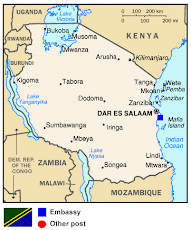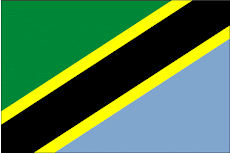Last Monday, I had the chance to meet a Tanzanian who is deaf, a really interesting experience because I studied American Sign Language while doing my undergrad at UALR and have several friends who are deaf. Sign language actually played a big part in my meeting Mr. Salazar, as did poker and Lt. Gov. Bill Halter, but that's a whole other thread.
My new roomate, Christina, who is also a special education teacher volunteering for Amani, met Ephrasia on the street. She stopped to say hello while walking along the Double Road--aptly named, the only road in Moshi with a partition between the lanes. She stopped to say "Jambo" and was greeted by Ephrasia with a barely audible "Si Jambo". When Christina asked her to speak up, she explained that she could not and that she was deaf. Before long, they were signing in what I call Swahinglish.
Christina learned ASL (American Sign Language) because it is commonly used with children who cannot otherwise communicate, like one of our children with autism at Amani. Christina had previously spent a length of time volunteering for Amani and was already fluent in Kiswahili when she arrived last month. Ephrasia had graduated from primary school and had attended some secondary school. She is fluent in both Kiswahili sign language and American Sign Language. But get this... she can also lip read in both Swahili and English.
A lot of signs in Kiswahili sign language are the same as in ASL. The sign for
poor is similar as is the sign for
school, work, and
teach. A key difference in Swahili sign language is that numbers are signed with two hands, rather than one.
A local teacher in town, a bartender at The Watering Hole actually, is fluent in Autstrailian sign language. I mentioned to her that I was blogging about my meeting with Ephrasia and she mentioned running into a deaf woman and her mother outside a hotel. She signed hello to the deaf woman, who looked at her puzzled. Her mother explained that two different sign languages are taught in Tanzania—American Sign Language (ASL) and another sign language, we think maybe Swiss. The dual language system is a result of previous volunteers who came to teach in the area. The end result is that, unlike in America, you have a population of deaf citizens who cannot communicate with each other and a deaf community severely lacking in cohesion.
In the U.S., the deaf community has its own unique and established culture. The homecoming at the state deaf schools are big events that people actually come home to attend and deaf clubs where people congregate with their families. In Tanzania, it seems that deaf people are rather on their own.













